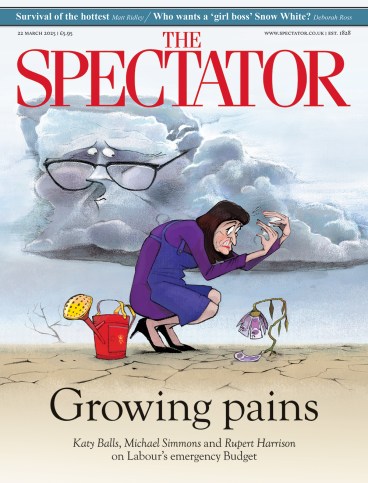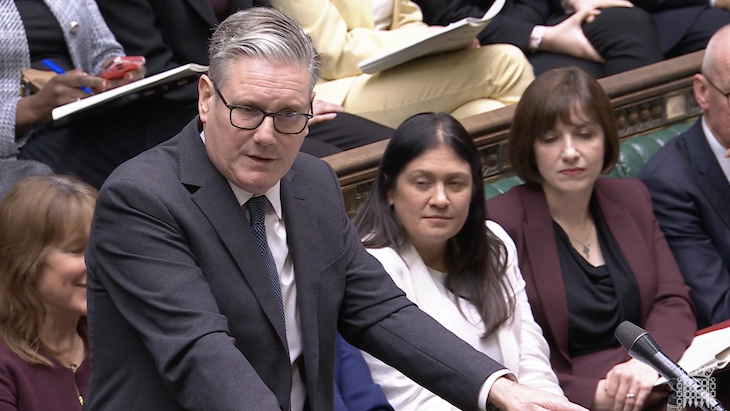
In the incessant conflicts of life and politics, people who know what they want tend to win. That is why Stalin won at Yalta and why, despite the extreme disadvantages of his country’s polity and economy compared with those of the United States, Vladimir Putin is outwitting Donald Trump. He wants Ukraine (and has related revanchist imperial ambitions), and has spent many years working out how to get it. His probing has taught him just how much both the United States and Europe, in their different ways, do not know what they want. The only real mistake Putin made was to think that Ukraine itself did not know what it wanted. It turned out that Ukraine most definitely does not want him. What about Trump? It is clear, as he has privately said, that he wants the Nobel Peace Prize, but on the issue of Ukraine itself, he is truly vague. His inner need seems to be to get it out of the way rather than to understand it. So Putin gets the better of every ‘very good’ phone call between the two presidents. And the pressure for Europe to work out what it really wants grows ever more urgent.
There is understandable rejoicing at the noise of the Trump/Musk chainsaw felling the dense jungle of American federal officialdom. But, in cutting Radio Liberty and Radio Free Europe (and Radio Free Asia), Trump is not simply paring back waste: he is depriving oppressed peoples of information their own countries block. This is all of a piece with Trump’s idea that Putin’s Russia is all right and Cold War attitudes are out of date. In fact, all Putin’s attitudes and methods derive from the Cold War – the belief in the use of violence, of surveillance, of kompromat, the crushing of ethnic and religious minorities, the use of grey-zone conflict and interference in elections, the incessant, organised propagation of lies and the persecution of journalists. If Trump sees nothing much wrong with the above, perhaps free Europe should live up to its name and start a radio station.
It is touching that the last of the Few should himself have been one of even fewer – the ten citizens of the Republic of Ireland who flew and fought in the Battle of Britain. Ireland, fiercely neutral under Eamon de Valera, saw less than no need to fight any battle of or for Britain. So a double courage was required of men like Group Captain John Hemingway, who died this week, aged 105 – the courage needed to take part in such deadly combat and that required to face indifference or even hostility from Irish Republicans. Mr Hemingway – so old that he was born when Ireland was still part of the United Kingdom – was offered by his father the choice between Trinity College, Dublin and the RAF. He chose the latter. As he put it, ‘I was always an Irishman fighting for the English’, and saw no contradiction in that. After all, a real enemy loomed, as it does for neutral Ireland, as part of Europe, today. Having lived in England, Mr Hemingway eventually retired to Dublin, happy in both countries. That’s good. He died on St Patrick’s Day.
Simon Hart, government chief whip at the end of the Tories’ 14 years in office, is not at all a bad man, yet he has done something which would, until quite recently, have had him driven from polite political society (if that is not an oxymoron). He has published the diaries of his time in the job. This is not completely unprecedented – Tim Renton, Mrs Thatcher’s last chief whip, included an element of such disclosure in his book on the history of chief whips, but that was published 15 years after the events described, not about events a year earlier. The wrong is obvious – the whips cannot do their work unless their MPs trust them to keep their secrets safe. Their silence is the secular equivalent of the seal of the confessional. The most interesting thing about Hart’s book is that such a person – a straightforward, mainstream, rural Tory – should feel able and happy to publish as he has. It shows how much the regimental code which held parliamentary parties, particularly the Conservatives, together, has broken down, making them unmanageable.
Jane Reed, former editor of Woman’s Own in the days when it sold two million copies, has died. She went on to become director of corporate affairs at Rupert Murdoch’s News International. I knew Jane, not through media connections but because, when I first came to London in 1979, she was my kindly next-door neighbour. I lived with a friend in his house in Fulham. The Times obituary quotes a description of Jane: ‘When she laughs her fruity laugh her large round glasses slip down her nose. There are no angles in her broad round face to hold them up.’ One day, my girlfriend was coming from Cambridge to see me, and I had bought her some flowers. There was a knock at the door. My landlord friend opened it and pushed me forward, crying: ‘Come on, blushing swain.’ The flowers and I burst out and fell into Jane’s ample arms. She had, it turned out, lost her house key. Her laughter was exactly as fruity and her spectacles as slippery as described above. She graciously declined the flowers, which was just as well because, once my girlfriend arrived, I could present them to her as intended. Not long afterwards, she agreed to marry me.
A vignette from the last day of the hunting season. I was approaching a timber fence. A charming young woman cantered up beside me. ‘I can’t see nothing,’ she exclaimed. ‘Oh, why?’ ‘It’s me eyelashes,’ she replied, jumping the fence regardless. They were indeed darkly enormous and curly and, she told me, very difficult to remove. Although she spoke in a 21st-century idiom, this was a classic hunting moment, as R.S. Surtees himself would have described and John Leech would have known how to depict.









Comments